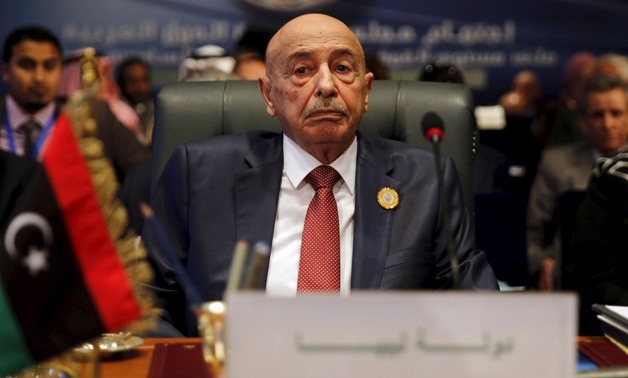
Speaker of Libyan House of Representatives, Aguila Saleh-Reuters
CAIRO-1 May 2018: Holding a presidential election in Libya before the end of 2018 is the only solution to solve Libya’s political crisis, especially that it is difficult to reach a real political agreement in Libya soon, according to Libyan House of Representatives Speaker Aguila Saleh.
In an interview with a Libyan TV channel, Saleh stressed that he will present the case before Libyan House of Representatives for holding an election to respond to the demands of the Libyan people.
On November 29, 2017, Ghassan Salamé, United Nations special envoy to Libya, stated that the U.N. mission was working on holding an election before the end of 2018, and many international and regional parties support the special envoy’s plan.
In this regard, Saleh said that the special envoy commended the enthusiasm of the Libyan people to have an election in 2018 in order to tighten security and prevent more division in Libya.
He confirmed that the Libyan House of Representatives and the High Council of State (HCS) delayed in fulfilling their commitment to hold the election, referring that there is not time to amend Libyan political agreements or to form a new Libyan government, adding the only solution for achieving stability is to hold an election in September, even amid persistent security concerns.
Regarding his latest visit to Morocco, Saleh mentioned that the visit came upon the invitation of Moroccan parliament to meet with HCS Head Khalid Al-Mishri, who vowed during their meeting to respond to the Libyan people’s demands to revive the Libyan political process.
In the same context, Libyan presidential candidate Aref Ali Nayed said that Egypt has exerted many efforts to build a new unified Libyan country.
He confirmed that the Libyan people are suffering from procrastination and poor basic services, stressing in this regard that it is urgent to hold an election in September.
Nayed praised the role played by Special Envoy Salamé to reach a solution for Libya, and he expressed his pleasure for being a presidential candidate in the upcoming presidential election.
During the meeting held on April 29 between Egyptian President Abdel Fatah al-Sisi and Foreign Minister Sameh Shoukry and French Foreign Minister Jean-Yves Le Drian, a number of issues of mutual concern were discussed, including updates of the situation in Libya.
Sisi and Le Drian concluded that there is relative progress in the situation in Libya, which reaffirms the need for a presidential election to be held in the country before 2019.
Libya, which is struggling to get through the critical political situation that it has been experiencing since 2011, is not only trying to unify its army, but is longing to revive its political functions by conducting presidential and legislative elections by mid-2018.
Egypt has hosted several meetings to bring Libya’s conflicted factions to the negotiations table, alongside members of Tobruk’s House of Representatives, to resolve the Libyan crisis and amend the Skhirat agreement, which aims at ending Libya’s civil war.
Khalifa Haftar, head of the Libyan National Army, now controls the eastern side of Libya and works in cooperation with the government of the House of Representatives, known as the Tobruk government. He has been backed by Egypt and the UAE in facing terrorist groups that have plagued the country following the ouster of former President Muammar Ghaddafi.
Egypt attempts to solve the crisis
Egypt’s officials held several meetings with their Libyan counterparts as well as members in Tobruk’s House of Representatives to resolve the Libyan crisis and amend the Skhirat agreement.
In December 2016, Cairo hosted a conference attended by Libyan officials and representatives from the country’s numerous factions, where they issued five proposed amendments to the agreement. The conference concluded with a decision to amend the eighth article of the Skhirat agreement that outlined the jurisdiction of the Libyan army chief commander.
Negotiations to unify the Libyan military were held as a part of Egypt’s initiative that kicked off in July 2017 to unify the military institutions. The first meeting aimed at creating a framework for the initiative, while the second and third meetings were held in Cairo from Oct. 29 to Nov. 2, 2017 to follow up on the results of the first meeting.
The fourth meeting was held from Dec. 6 to 9 to restructure the Libyan army.
Egyptian officials met again with Libyan military forces in Cairo on Feb. 21, 2018 in order to continue the discussions. The meetings delved into the methods used to unify and restructure the Libyan military forces after the long split that resulted from the outbreak of the Libyan revolution in 2011.
The sixth round of negotiations on the unification of the Libyan military establishment was held on March 23 in Cairo.
In a press release issued at the conclusion of the meeting, the Libyan factions convening in Cairo agreed to resume their talks in an attempt to complete the establishment of the four technical committees that the Libyan factions agreed on forming during the previous rounds of talks as an initial step towards the consolidation of the military establishment of Libya.
The meeting also concluded with reaffirming the participants’ keenness to move ahead with unifying the Libyan army, whose top priority is to maintain and preserve Libya’s national security and peace and to stand firm against foreign interferences.
Members of the Security Council welcomed recent efforts to strengthen an inclusive political dialogue among all Libyans, supported by Libya’s neighbors, international partners and regional organizations, within the framework of the Libyan Political Agreement endorsed by U.N. Security Council Resolution 2259.

Comments
Leave a Comment